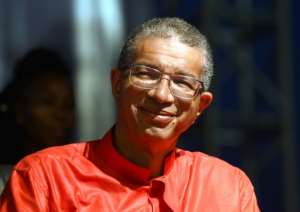
Cotonou (AFP) - Benin's presidential elections reach a climax on Sunday, when Prime Minister Lionel Zinsou takes on businessman Patrice Talon to succeed Thomas Boni Yayi in the country's top job.
- The technocrat: Lionel Zinsou -
The 61-year-old Franco-Beninese banker surprised everyone when he quit as head of one of Europe's biggest investment funds, PAI Partners, to become prime minister last June.
Despite initial denials he was Boni Yayi's appointed successor, he has since been endorsed as the candidate for the president's ruling Cowry Forces for an Emerging Benin (FCBE) party.
Two major opposition groupings have also come out in support.
But in the first round of voting on March 6, Zinsou beat Talon by only a tight margin -- 27.11 percent versus 23.52 percent -- and has since seen 24 beaten candidates come out for his rival.
Zinsou, a graduate of France's elite Ecole Normale, was a speechwriter for the socialist former prime minister Laurent Fabius in the 1980s.
But since his appointment in Benin, he has swapped his tailored business suits for flowing African robes and punctuates his political rallies with expressions in the local Fon language.
He also regularly reminds voters of his political pedigree: his uncle, Emile-Derlin Zinsou, was a former president.
To critics who accuse him of knowing nothing about Benin, he responds that despite his work in France he has "never stopped coming" to the West African nation.
The walls of his elegant Cotonou villa are covered with works of art from his large contemporary African art collection
"My father, children, business, charitable foundation and fledgling companies have all been here," he told AFP.
Yet he has struggled to shake off his image as a Parisian technocrat.
His detractors, who dismiss him as "yovo" or "the white man", claim France, Benin's former colonial masters, has "parachuted" him in to revive its "Francafrique" policy.
His supporters on the other hand highlight his successful career, his optimism for Africa and an address book including US President Barack Obama and the philanthropist Bill Gates.
For them, he is the man to develop impoverished Benin.
- The businessman: Patrice Talon -
Patrice Talon turned up to vote in the first round of the election driving a Porsche, wearing a white open-necked shirt, a fitted suit and sun-glasses.
The image he portrays is of a big-spender and a self-made man, hoping for a break with the past in the country's politics.
The well-known entrepreneur, who made his money in the key sector of cotton and running Cotonou's port, was one of the most powerful figures in Beninese business.
But he became public enemy number one of Boni Yayi, whose successful presidential election campaigns he bankrolled in 2006 and 2011.
In 2012, he was accused of being the brains behind a bizarre alleged plot to poison the president, then the following year of attempting to endanger the security of the state.
At the time, Talon was being prosecuted in several embezzlement cases and fled the country. Boni Yayi pardoned him in May 2014, paving the way for his return and bid for election.
Talon comes from modest origins in the coastal town of Ouidah and is the son of a primary school teacher father.
His ethnicity -- Fon -- like the former president Nicephore Soglo has been seen as an advantage in his early career and since then he has maintained close links with power.
He decided to run for president following his return from exile in Paris "perhaps as a way of protecting himself by becoming a major political figure rather than a rich but vulnerable businessman", said analyst Gilles Yabi, from the Wathi West Africa think-tank.
His success and taste for luxury have attracted support from many young Beninese, who see in him a person who knows how to create jobs and wealth on a national scale.
For the second round, he has the support of 24 of the 32 candidates from the first round, including fellow businessman Sebastien Ajavon, who won 22.07 percent of the vote.




 Chief arrested for killing soldier at Kasoa over land
Chief arrested for killing soldier at Kasoa over land
 GAF probes soldier’s murder at Kasoa Millenium City
GAF probes soldier’s murder at Kasoa Millenium City
 Ghana steps up effort to pass new Labour law
Ghana steps up effort to pass new Labour law
 AG advises EOCO against money laundering probe into Cecilia Abena Dapaah’s affai...
AG advises EOCO against money laundering probe into Cecilia Abena Dapaah’s affai...
 May Day: I'll prioritise welfare of workers, abolish compulsory retirement age a...
May Day: I'll prioritise welfare of workers, abolish compulsory retirement age a...
 V/R: Adaklu-Tevikpo murder suspect arrested from hideout
V/R: Adaklu-Tevikpo murder suspect arrested from hideout
 Kasoa: Soldier killed by alleged land guards over land dispute — GAF
Kasoa: Soldier killed by alleged land guards over land dispute — GAF
 Fatal shooting of soldier happened at Gomoa East not Kasoa; stop tarnishing our ...
Fatal shooting of soldier happened at Gomoa East not Kasoa; stop tarnishing our ...
 ‘We condemn unprovoked attack in no uncertain terms’ — GAF on fatal shooting of ...
‘We condemn unprovoked attack in no uncertain terms’ — GAF on fatal shooting of ...
 Ghanaians urged to ensure violence free elections on December 7
Ghanaians urged to ensure violence free elections on December 7
